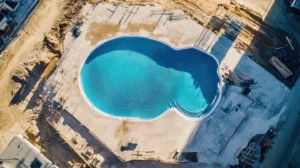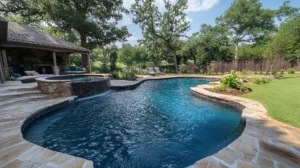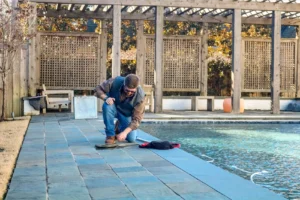Winter Pool Maintenance Mistakes Can Be Costly.
Winter pool maintenance is important to ensure that your pool is in good condition when spring arrives and you’re ready to start swimming again. However, many pool owners make common mistakes during the winter that can lead to costly repairs and problems down the road.
Here are 7 of the most common winter pool maintenance mistakes to avoid:
1. Neglecting Regular Inspections
It’s important to inspect your pool regularly throughout the winter, even if you’re not using it. This will help you to identify any potential problems early on, before they have a chance to cause major damage.
Pay special attention to the following areas:
- Pool cover: Make sure that your pool cover is secure and free of rips or tears.
- Pool equipment: Look for any signs of leaks or damage to your pool pump, filter, and other equipment.
- Pool chemistry: Test your pool water regularly to make sure that the pH and alkalinity levels are within the recommended range.
2. Failing to Maintain Proper Water Chemistry
Even though you’re not using your pool as often during the winter, it’s still important to maintain proper water chemistry. This will help to prevent algae growth and other problems.
Aim to test your pool water every few weeks during the winter and add chemicals as needed to keep the pH and alkalinity levels between 7.0 and 7.4. You may also need to add algaecides and other winterizing chemicals to prevent algae growth and scale buildup.
3. Not Protecting Pool Equipment
Pool equipment is especially vulnerable to damage during the winter months. To protect your equipment from freezing, drain the water from the lines and pumps. You can also wrap the equipment in insulation blankets or store it in a heated shed or garage.
4. Allowing Debris Accumulation
Leaves, twigs, and other debris can accumulate in your pool during the winter, even if you have a pool cover. Be sure to remove debris regularly to prevent it from clogging your skimmer and filter and causing algae growth.
5. Using the Wrong Pool Cover
Not all pool covers are created equal. When choosing a pool cover for the winter, make sure to select one that is specifically designed for your pool type and size. The cover should also be made of a durable material that can withstand the harsh winter weather in Memphis.
6. Draining the Pool
If you live in an area with cold winters, you may need to drain your pool completely to prevent freezing damage. However, it’s important to drain the pool correctly to avoid damaging the pool structure.
To drain your pool safely, follow these steps:
- Draining your pool can destroy the surface. The plaster surface is designed to be wet not dry. This can cause cracking, delamination, premature failure.
- Draining your pool can cause your pool to “float”. When there is no water in the pool, it can literally begin to shift and start to come out of the ground. This is catastrophic to your pool and it means you will need.
- An empty pool is a huge safety hazard.
- An empty pools means there is NO water moving through plumbing which can cause the water leftover in the pipes to freeze.
7. Overlooking Necessary Repairs
If you notice any damage to your pool or equipment during the winter, don’t delay in making repairs. Fixing problems early on will save you money in the long run.
Think You Might Need Repairs?
Give us a call or schedule a free inspection. Our team will help you navigate the options for making the necessary repairs.
Conclusion to Winter Pool Maintenance Mistakes to Avoid
By following these tips, you can avoid common winter pool maintenance mistakes and ensure that your pool is in good condition when spring arrives.


